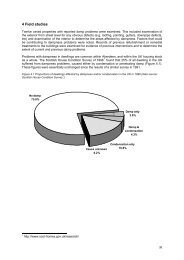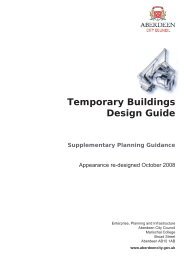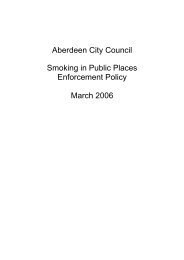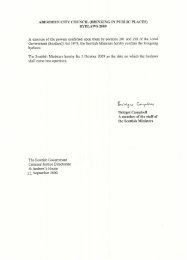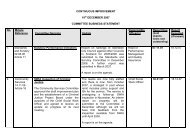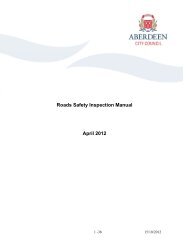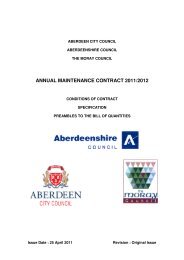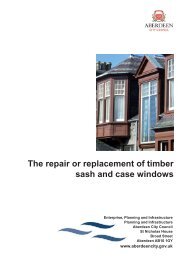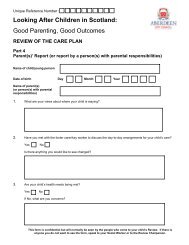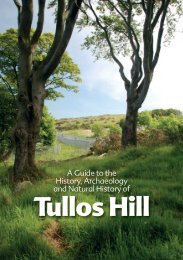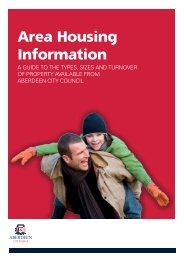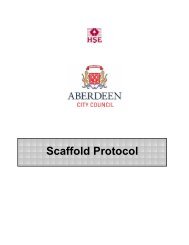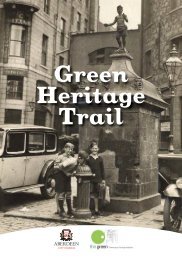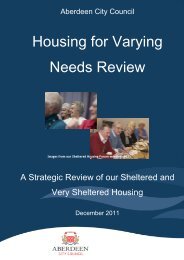he concept of the Burgess oath belongs - Aberdeen City Council
he concept of the Burgess oath belongs - Aberdeen City Council
he concept of the Burgess oath belongs - Aberdeen City Council
- No tags were found...
You also want an ePaper? Increase the reach of your titles
YUMPU automatically turns print PDFs into web optimized ePapers that Google loves.
While t<strong>he</strong> fairs attracted sellers andbuyers from a wide area, t<strong>he</strong> weeklymarket existed primarily for t<strong>he</strong> benefit<strong>of</strong> <strong>Burgess</strong>es. All goods had to bedisplayed for sale in open market onfixed days and at fixed hours so thateveryone had an equal chance to buy.Prices, too, were regulated, w<strong>he</strong>t<strong>he</strong>r <strong>of</strong>household consumables or <strong>of</strong> rawmaterials for industry. Breaking t<strong>he</strong> coderesulted in a fine.Those from outside t<strong>he</strong> burgh whobrought goods to t<strong>he</strong> market or whobought from it had to pay market tolls.T<strong>he</strong>se tolls and fines all went to swellt<strong>he</strong> Royal c<strong>of</strong>fers, as did t<strong>he</strong> customs ongoods imported and exported throught<strong>he</strong> harbour. T<strong>he</strong> King expectedtownsfolk to act as unpaid collectors andas baillies to run t<strong>he</strong> burgh and add tohis income.A number <strong>of</strong> charters given bysucceeding Kings show how <strong>Aberdeen</strong><strong>Burgess</strong>es benefited from t<strong>he</strong>ir patronageby t<strong>he</strong> granting <strong>of</strong> trading privileges andexemption from tolls and customs, notonly in t<strong>he</strong> burgh but throughoutScotland.Anot<strong>he</strong>r privilege granted by KingWilliam gave <strong>Burgess</strong>es freedom to actas a corporate body with powers to makeits own rules <strong>of</strong> local government, aprecursor to t<strong>he</strong> establishment <strong>of</strong> a Town<strong>Council</strong>.A later charter given by William’s son,King Alexander II, dated only Alyth 27February, conferred on <strong>Aberdeen</strong> rightsand privileges similar to thosepreviously granted by William t<strong>he</strong> Lionto Perth. T<strong>he</strong>se included control <strong>of</strong>wholesale trade in wool and skinsthroughout t<strong>he</strong> S<strong>he</strong>riffdom <strong>of</strong> <strong>Aberdeen</strong>and a grant to my <strong>Burgess</strong>es <strong>of</strong><strong>Aberdeen</strong>, except waulkers and weavers,that t<strong>he</strong>y have t<strong>he</strong>ir merchant guild.Thus, t<strong>he</strong> Guild was establis<strong>he</strong>d inemulation <strong>of</strong> t<strong>he</strong> King’s burgh <strong>of</strong> Perthand <strong>of</strong> every ot<strong>he</strong>r burgh withpretensions to overseas trade in cloth.T<strong>he</strong> surprising thing is that this is t<strong>he</strong>last mention <strong>of</strong> t<strong>he</strong> merchant guild <strong>of</strong><strong>Aberdeen</strong> - records <strong>of</strong> burghadministration beginning in t<strong>he</strong> 14thCentury refer simply to t<strong>he</strong> Guild orGuildry <strong>of</strong> <strong>Aberdeen</strong>.While craftsmen, even as <strong>Burgess</strong>es,were restricted to dealing in goods <strong>of</strong>t<strong>he</strong>ir own manufacture within Scotland,t<strong>he</strong>y could import raw materials fromabroad for t<strong>he</strong>ir own use.Merchant <strong>Burgess</strong>es, on t<strong>he</strong> ot<strong>he</strong>r hand,could buy goods from many sourcesthrough t<strong>he</strong> network <strong>of</strong> local markets,selling t<strong>he</strong>m at home and overseas andimporting manufactured goods andagricultural produce. This kind <strong>of</strong> trade,not based on manufacturing input, wast<strong>he</strong> jealously guarded prerogative <strong>of</strong> t<strong>he</strong>Guild brethren who paid significantlyhig<strong>he</strong>r entry fees to t<strong>he</strong> Town <strong>Council</strong>.Craftsmen could join t<strong>he</strong> Guild onlyafter forswearing t<strong>he</strong> practice <strong>of</strong> t<strong>he</strong>ircraft and by making up t<strong>he</strong> entry fee tot<strong>he</strong> hig<strong>he</strong>r rate.In t<strong>he</strong> early 15th Century w<strong>he</strong>n regularrecords began, every <strong>Burgess</strong> paid abasic fee, in real terms probably £100,



